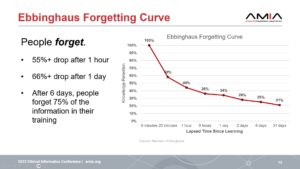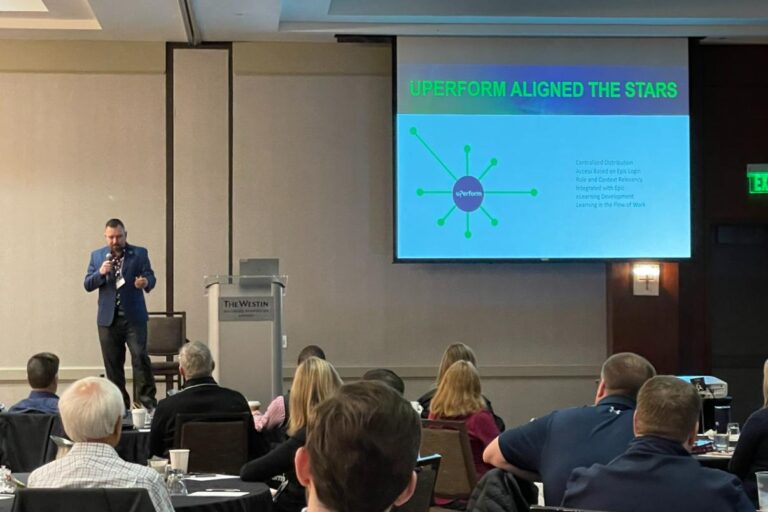uPerform’s Bobby Zarr was joined by Dr. Ryan Walsh, CMIO at Memorial Hermann, and Dr. CT Lin, CMIO at UCHealth, at the 2023 AMIA CMIO Forum. The panel of experts discussed how health systems can look to create a better EHR experience by delivering education at the right place and time with a scalable virtual training strategy.
Dr. Lin and Dr. Walsh draw on decades of experience in healthcare IT. They are each on a journey to revamp how EHR education is delivered at their respective organizations.
In this panel discussion, they share where their traditional training was falling short, what influenced them to change their approach and how they’re finding success with a new approach to EHR training and education.
Key Takeaways
- EHR efficiency is a key factor in overall satisfaction, signs of burnout and turnover
- Clinicians want more training, but it needs to be high value
- Classroom training results in low retention, low satisfaction and is difficult to scale
- Self-paced training reduces time spent in training, improves satisfaction and delivers more value
- Delivering learning materials in the EHR workflow can drive efficiency and satisfaction
School’s out (forever): ditching the EHR classroom
Both Dr. Walsh and Dr. Lin acknowledged that their existing training models weren’t working. First and foremost, the COVID-19 pandemic meant that in-classroom training put their learners at increased risk. But it also allowed leadership to step back and consider what else wasn’t working.
Dr. Lin notes that no one was happy with classroom training. Tech-savvy users often felt like they were waiting for the rest of the class to catch up, while less tech-savvy users often felt like lessons moved too quickly. When faced with COVID-19, UCHealth made the switch to instructor-led virtual training, but they still encountered the same challenges. This led them to make the switch to an asynchronous, or self-paced, learning model.
In addition to low satisfaction, traditional classroom training poses other challenges to organizations:
Short attention spans – Clinicians are busy and attention spans are short. Throughout his career, Dr. Lin has discovered that clinicians are less likely to engage with content the longer it is.
Ebbinghaus Forgetting Curve – One of the biggest downsides to traditional classroom training is knowledge retention. The Ebbinghaus Forgetting Curve shows that learners forget over 55% of what they learn in the first hour, and 75% within six days.
Accessibility – With traditional training, users often have little to no access to support once they have completed initial training. A lack of support at a user’s time of need can lead to mistakes or incorrect workarounds that become part of their muscle memory and are hard to unlearn.
UCHealth and Memorial Hermann are each on their own journey to revamp their EHR education, but neither one has any intention to return to the classroom. They recognize that EHR education needs to evolve to meet the needs of their learners. For Dr. Lin and Dr. Walsh, that means offering small bits of training when and where users need it and leveraging any resources available to make that a reality.
Deconstructing the onboarding model
UCHealth’s journey starts with blowing apart their onboarding model. Their new self-paced onboarding format has reduced the time it takes to onboard new hires, improved satisfaction with their EHR training and allowed their training team to provide more value to the organization with at-the-elbow training.
With this deconstructed approach, users can gain access to Epic and start seeing patients in as little as one and a half hours. It’s a stark contrast to the 8-hour classroom session previously offered. With this phased approach, clinicians can more easily absorb new information as they work. They learn at their own pace, when and where it works for them.
Signs on the roadway: A roadmap to success
While discussing the Ebbinghaus Forgetting Curve, Dr. Walsh expresses his own doubts about traditional training methods. He argues that people often learn best through reinforcement and learning while they work.
On a similar train of thought, Dr. CT Lin and UCHealth have begun putting ‘signs on the roadway.’ Understanding that training doesn’t stop at onboarding, UCHealth is leveraging uPerform to deliver content in the workflow. This allows users to access the help they need to complete new or infrequent tasks they may not be familiar with. It’s also effective for training clinicians on new workflows or changes to existing workflows.
TikTok-torials: Unleashing the potential of microlearning
Dr. Lin and Dr. Walsh are also taking notes from social media. Providing EHR users with access to learning materials in their workflow is only half the battle. The next challenge is getting users to engage with those materials.
Social media has changed the way we consume information, and it’s up to IT leaders and training teams to adapt. Dr. Lin humbly recounts when he used to create 15-minute how-to videos. Both Dr. Lin and Dr. Walsh agree that less is more, and keeping learning content short and focused is a better way to train clinicians.
Delivering valuable training at scale
Classroom training is difficult to deliver at scale. Classroom space, instructors and time are all in short supply. Furthermore, because classroom training relies on an instructor, it is difficult to deliver a consistent and tailored learning experience across all roles and locations within a health system. These challenges only multiply when you factor in frequent EHR upgrades, mergers and acquisitions and increasing turnover.
A self-paced learning model allows organizations to rapidly scale EHR education. Dr. Lin shares how UCHealth was able to scale training to rapidly onboard 180 volunteer nurses during the pandemic.
Getting clinicians ‘On the Road Again’
Wrapping up the session with a bit of fun, Dr. Lin debuted his latest ukulele parody, “On the road again”. The song describes how, with integrated training on-demand, clinicians can finally hit the road again, equipped with the knowledge and skills to navigate the EHR successfully, bringing confidence and efficiency to their daily activities.
Related Articles
Ready to rock with uPerform?
Contact us to learn how health systems around the world are scaling up their health IT training strategies with uPerform to deliver more effective learning when and where users need it most.








